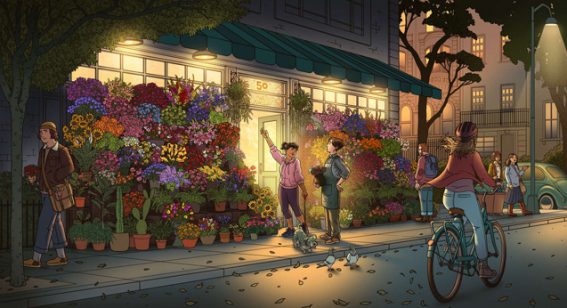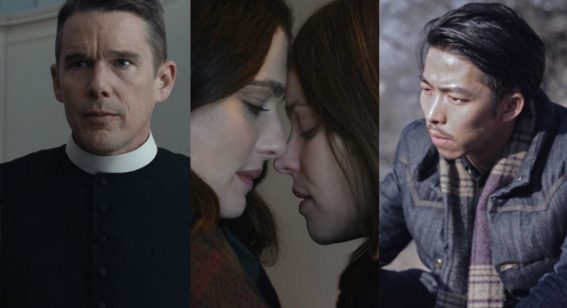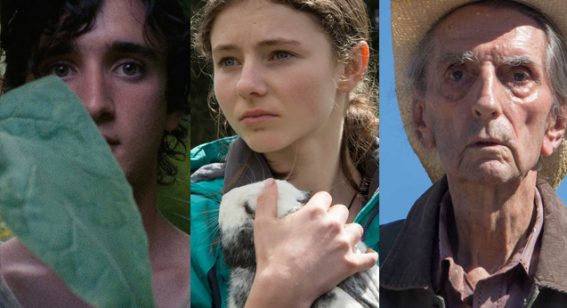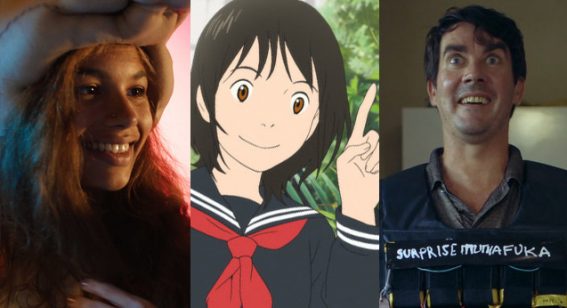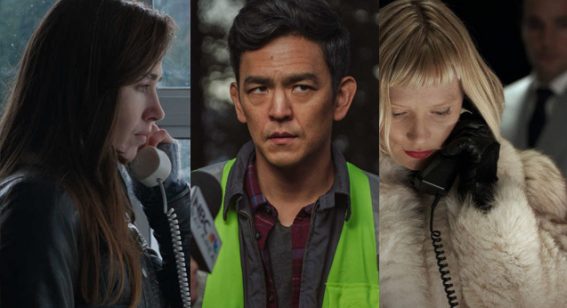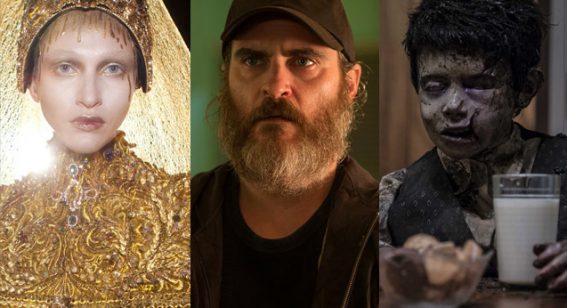NZIFF 2018 mini-reviews (A to C)
What we’ve seen, loved, and maybe not loved.
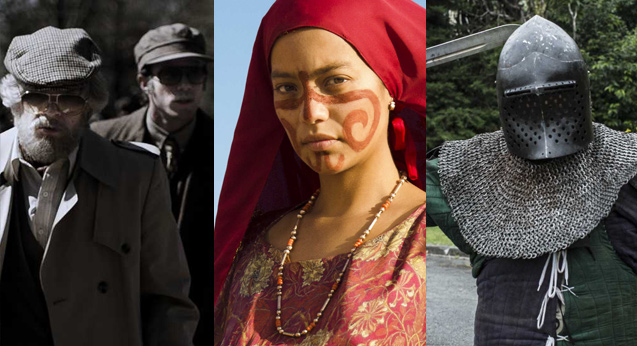
Flicks has sent its mighty writers all over the Auckland section of the New Zealand International Film Festival. Here are the films we’ve seen and what we’ve thought of them. (This page is updated daily-ish.)
3 Faces
Despite being banned from making films, Iranian director, producer and writer Jafar Panahi has only bloody gone and made another one, and thank goodness for that. 3 Faces begins with a disturbing cell-phone video which has been sent to Panahi (playing himself) in order to reach the unreachable actress Behnaz Jafari (also playing herself), resulting in the pair setting off on an impromptu road trip to investigate. The intrigue eventually gives way with gentle grace to a deeper study of Iranian society’s cultural expectations, set largely in the rural villages of Azerbaijan. Considering the subject matter and location, the film is peppered with several surprisingly sweet and occasionally surreal moments and has been one of the most rewarding watches of the festival so far. -MATTHEW CRAWLEY
Following Tehran Taxi and This is Not a Film, Jafar Panahi continues his valiant reputation as the Robin Hood of Iranian cinema (he’s still technically banned from filmmaking). The core plot dangles a good carrot of mystery that starts off grimly serious before going somewhere completely different. Ultimately a character showcase, Panahi’s love for the common person seeps through with an abundance of charm, a prickly sense of humour, and a strong performance from Behnaz Jafari. -LIAM MAGUREN
Ága
Survival, heartbreak, encroaching obsolescence in the Arctic wilderness. Wistful, compactly scripted macro/micro stuff. Enveloping cinematography a big-screen must. -AARON YAP
The more time passes after taking in this contemplative and charming story of an ageing Yakut couple, living out their lives in the Arctic north of Siberia, the more it lingers in my mind. Deceptively simple, this fictional-but-real-feeling ice-bound tale is a study in the deep bonds of companionship, family ties, and of a changing world, from the perspective of those for whom nothing had previously changed in generations. From watching the pair go about their daily routines of fishing and trapping, to spirit animal spotting and soup slurping, Ága is a unique pleasure from start to finish. -MATTHEW CRAWLEY
American Animals
The actors are all great, the blend of documentary and reenactment is compelling, the musings on the subjective nature of truth add flavour, and the parts that aim to thrill succeed admirably. But really, who cares about four jerks who felt like they were owed something and so went out and stole it? The film plays it for laughs and gestures vaguely toward an emptiness at the heart of modern life but ends up way too enamoured with these comfortable middle-class dudes and their massive sense of entitlement. -TONY STAMP
Bart Layton’s American Animals is possibly the stylish and snappy jock movie of the festival – four young, white, privileged college dudes who plan and execute an art book heist pretty much because… well, they are bored. If it weren’t for the fact that this story is true and takes a tragi-bumble turn, the lack of empathy with the guys and their sticky volitional situation can be forgiven. Technically brilliant, the reenactments are shot and spliced seamlessly and cleverly with interview footage in an editing tour de force, and although it’s certainly not American Pie, it whiffs perilously close character-wise at times. – SARAH VOON
The trailer for this film was one of the most enticing of this festival’s selection, and for the most part the energy and intrigue carries over into the feature. This true-story-tale seamlessly (and often hilariously) weaves together real life interviews with the action, no Netflix style docu-drama here. The premise and its execution alone make this worth the watch, with Barry Keoghan (the little creep from The Killing of a Sacred Deer) in particular turning out another excellent performance. Somehow, when all’s told, there’s a sniff of style over substance in the air, but who cares, I guess – we could use a little more style at the cinema. -MATTHEW CRAWLEY
If you enjoy a spot of true crime, you’ll know how effective interviews can be at creating a sense of foreboding and curiosity at how things will turn out. Here, contemporary interviews with real-life heist participants are used to punctuate an extremely well-acted dramatisation of events. At times the narrative retelling feels overstylised, with director Bart Layton throwing the kitchen sink at its visual aesthetic, but the pairing of drama and doco works to keep things tense and surprising, right up until the point that the budding criminals’ plan is put into action, when Layton’s film reaches out and grabs you – viscerally, intensely. -STEVE NEWALL
Similar to what he did with 2012’s excellent The Imposter, director Bart Layton expresses the truth of this college crime incident with creative slants that never intend to deceive but always makes it clear that reality and recollection aren’t healthy bedfellows. Layton also tapped that “could I actually pull off a heist?” curiosity in my head only to go for the full king hit when the actual heist goes down. Gut-twisting tension is rarely done this well, complemented by a fascinating deep-dive into the psyche of these young, empty, entitled, egotistical, wannabe hustlers. -LIAM MAGUREN
The Ancient Woods
The tendency to anthropomorphise will find plenty of ‘characters’ in the vertebrate and invertebrate cast (eg: crows are arseholes; field mice are optimistic idiots; snakes are… well, snakes) – however, all pleasingly uneditorialised via the absence of any narration. Enough to confound and silence a very loud matinée (read: boomer, sorry mum) audience. Cripes. -SARAH THOMSON
I’m not sure how you say “Hakuna matata” in Lithuanian, but I’m happy to report that the Circle of Life is spinning no worries in the Baltic Forest documented in this wonderfully contemplative film. Without a single word spoken throughout, we are treated to intimate insights into the belly scratching habits of the badger, the stashing of acorns in cosy burrows, spiders in the ice, and very much more. God bless David Attenborough, but it’s a rare pleasure to spend time observing the animal kingdom so close up without his narrative telling us what we’re seeing. Lovely stuff, Earth is cool. -MATTHEW CRAWLEY
Buzzy nature doco ditches narration and score – this certainly ain’t another Attenborough impersonator – and instead immerses in remote forest setting, atmospheric audio helping immensely. Following clusters of animals for a few minutes at a time, gorgeously shot in different, more poetic, fashion to Natural History Unit equivalents, The Ancient Woods sustains audience curiosity and sense of wonder with its animal introductions – shitty storks being among my many faves. -STEVE NEWALL
Angels Wear White
The angriest, most devastating film I saw this year. The subject matter is extremely emotionally charged, but Vivan Qu is a such a good storyteller it never feels manipulative, she just relays events and lets their cumulative power take hold. Qu clearly has something to say about being helpless in the face of authority, and when it all hits home during the final haunting shot its effect is overwhelming. -TONY STAMP
Animation NOW!
I went to two of the six schedules in this year’s festival-within-a-festival and the international offering is possibly the mightiest I’ve ever seen from Animation NOW. For the hardcore auteur-lovers, the psychedelic Crux and jazz-tastic Cupcake played superbly. For general audiences, Terry Gilliam-tier Wednesday with Goddard and the heart-mending Threads hit their marks just as well. Within that spectrum, homegrown drama Trap danced perfectly within narrative ambiguity while closing short Ugly proved accessibly batshit insane.
The handmade programme didn’t play quite as strong. I’m not that big on rotoscope, regardless of whether it’s done by hand or on a computer, so the likes of Strange Case and Silent London washed over me. And while Deyzangeroo and Evening were crafty in their process, there wasn’t a knockout technique to be found in the realm of Muto (which used street art in stop-motion) or Here and the Great Elsewhere (made painstakingly on a pin-screen). Fortunately, the traditional stop-mo shorts won the day with Laika-level film Lost Property Office and two lovely odes to parents – Negative Space and After All. And The Battle of San Romano is one trippy, spectacular piece of art. -LIAM MAGUREN
Apostasy
Lensed with cold and calculated precision, this superbly bleak look at a Jehovah’s Witness sector often frames its characters in isolation against a blank wall of a single muted colour. The sparse sound design assists this strong feeling of solitude and servitude, the audio-visual wedge that borrows into the mother and daughters affected by the titular apostasy. With two sizable “holy shit” moments and a titanic performance from Siobhan Finneran, this marks a mighty feature debut from writer-director Daniel Kokotajlo. -LIAM MAGUREN
Arctic
For some reason, the perpetually serious Mads Mikkelsen never gets the cheerful roles, and he certainly isn’t having much fun being stranded in the Arctic after a plane crash. But heck, he’s making the most of it by … trying not to die in the myriad of ways it’s likely he will. Stunning scenery and a believably weary but determined Mads make this worth a watch. Kind of like The Martian, but with ice instead of red dirt, he doesn’t use his poo to grow food and, being on Earth, there’s a higher chance of being rescued … or is there? Or isn’t there? Or is there? Well… (said in Dicky Dad Voice)… you’ll just have to watch it and find out. -MATTHEW CRAWLEY
Ash is the Purest White
A strange, slow epic of romance and how people change over time, this also provides a fascinating insight into how Chinese society has changed since the millenium. Tao Zhao is hypnotic as the lead and if the world worked properly, she’d be a shoo-in for an Oscar nod. While this is a powerful film, there are plenty of quirky laughs, particularly of the musical variety – look out for the frequent bursts of the Village People and a couple of hilarious ballroom dancing scenes. -DANIEL RUTLEDGE
The Atlantic
Tough going at times, this – and elsewhere leaning to poetic and fascinating. As a filmmaker travels the Atlantic, island-hopping and capturing the geography and various inhabitants, his journal-like musings are delivered in the wonderful voice of Max Von Sydow, whose pipes only emphasise his script’s often-portentous nature in booming Swedish. Most interesting to me were the lifestyles hinted at on island communities like St Helena and relics of vacated settlements, rendered distant in both time and space thanks to this somewhat battered film. -STEVE NEWALL
About two minutes in, I felt I made an awful mistake watching this. We’re spoilt for choice when it comes to glorious images of nature thanks to digital photography, so the worn-down print of The Atlantic showed its age. I was also left wondering what the biggest art film cliche was: Max von Sydow’s omnipotent voice pontificating the ocean in relation to our limited mortality or the sad oboe soundtrack that accompanies him. The subtitles often raced by way too fast, making it difficult to stay in tune with certain stories. Despite brief moments of valuable documentation, I felt like I was better off missing this. -LIAM MAGUREN
A mood: the droll contemplative drone of Max von Sydow against a 35mm-lensed travelogue of remote island villages and their people around the Atlantic. -AARON YAP
Felt a surge of nerd as I read that this would be presented in 35mm in the Civic, a mid 90s doco/poem that takes us to various islands in the Atlantic, from the cold north to the cold south. The first minute is a shock, the print looks terrible, the camera set on a surf crashing on rocks, grim, boring, oh shit this could be a life suck. The teenage boy dragged here by his father next to me is in full CGI withdrawal, twitching. He probably hated it but you have to have faith in film fest fare, especially as this is a 50th anniversary replay and Bill Gosden has fronted to intro it, should be one of the best ever I supposed, and so it proved to be. Not shiny but full of inner shimmer. By time we’re taken to the former whaling stations in South Georgia we are transformed. Yes. -PAUL CASSERLY
Beirut
Directed by Brad Anderson from a screenplay by Tony Gilroy, Beirut has great pedigree, but fails to deliver as either a highly charged political thriller, or a slow-burn spy caper. John Hamm plays an alcoholic diplomat dragged back to the city that destroyed his family. As the complex plot and Middle East machinations unfold, it’s pretty hard to care much. Compared to the likes of Gilroy’s Michael Clayton and Bourne movie scripts, it’s a well-made but pretty dull affair that relies almost entirely on its lead actor’s charisma. Mildly entertaining, but ultimately too detached and dull to make a lasting impression. -ADAM FRESCO
If you are keen on a sweaty, Jon Hamm in a sultry kidnapping terrorist drama set in 1970/80s Beirut, this is the film for you! Like watching Don Draper on a bender in a low budget Mission: Impossible, it’s hard not to be entertained, the evocative costumes, staging and locations framing some chunks of interesting story. It would serve you well to brush up on your Middle Eastern politics around this era before you go, as the sometimes confusing storyline dips and dives. A few cheesy moments and some unnecessarily simplistic dialogue intersperse an otherwise absorbing action-packed story. -SARAH VOON
Birds of Passage
A meandering first half hour may unsettle those allergic to slow cinema, but the initial pace acts as a serene counterpoint to the tragic mayhem that eventually unfolds when drug-trafficking enters the lives of the Wayuu people. Flipping the rags-to-riches trajectory, it’s a film that succeeds in showing how power and wealth can infect and erode a native way of life, brilliantly illustrated by time-hopping jump-cuts that equate excess to tumours. As a family-centric cautionary crime drama, this is just a shelf below The Godfather. -LIAM MAGUREN
Embers of gangster tropes galvanised by otherworldly, disarmingly alien vision. Scarface meets The Act of Killing. Vivid, haunting, absolutely unique. -AARON YAP
A film about the ravages of colonialism and capitalism starting their infamous reign in modern Colombia, told through they eyes of the indigenous Wayuu, this was an incredible way to launch the festival. Exotic yet classical, gorgeous yet brutal, Birds of Passage is what the festival is all about and a brilliant way to celebrate its 50th birthday in Auckland. -DANIEL RUTLEDGE
A slow burner, Ciro Guerra and co-director Cristina Gallego’s Birds Of Passage grinds through unfamiliar arid Northern Colombian landscape, beginning with a hypnotic mating dance that beats Tinder any day. A gentle assault on the senses, this film is a visually stunning portrayal of the Wayúu people, their guttural language, ancient rituals, and the hazy origins of the Colombian drug trade gradually revealed with a lazy elegance and an increasingly gripping storyline. A love-drug-murder-revenge tale set during the 1960s, 70s and 80s with strong performances from lead couple Rapayet (José Acosta) – a handsome outsider, Zaida (Natalia Reyes) the beautiful young woman who is painted and presented to dance for suitors, and Zaida’s mother the formidable matriarch Ursula (Carmiña Martínez) whose power is sustained by talismans, traditions and sheer will. – SARAH VOON
The Bard meets bud in Shakespearean drama chronicling an extended family’s forays into industrial-level weed exportation from Colombia. Marriage, betrayal, murder and vengeance are the familiar elements propelling this along – less so is the indigenous culture at the film’s epicentre, fascinating rituals and traditions operating in tandem with the human motivations common to all cultures. A patient and moving tale with many more interesting facets than your run-of-the-mill rise and fall of a criminal empire tale. -STEVE NEWALL
Bludgeon
Has a good wallop of 100% NZ personality thanks to its naturally charming subjects. There are more actual wallops in this positively maniacal sport that they love, making me flinch more than a litre of coffee. Unfortunately, it left me a little unsatisfied in the end. The main stories we follow don’t have conclusions strong enough to justify the running time dedicated to them while the journey of smaller side characters end in ways that made me wish I knew them better. But that’s more of a criticism of how life often works than of the film itself. -LIAM MAGUREN
Sparkling documentary shining light on small-town Kiwis enjoying a bit of brutal medieval combat. Newbie directors Ryan Heron and Andy Deere display a genuine fondness for their subjects, sidestepping sarcasm to focus on an array of offbeat characters so bonkers they must be real. Warm, funny and fascinating, if you love docos focusing on the kooky and quirky corners of Aotearoa, like Spookers and Pecking Order, then you’ll get a real kick, thump and bash out of Bludgeon. -ADAM FRESCO
An utterly unique documentary that starts out as a love letter to small town New Zealand and develops into a delightful, uplifting ode to working as a team and achieving one’s goals. This is an examination of niche obsession, which is almost always interesting, but rarely do we get a set of characters as fascinating as those collected together here. As a charming illustration of the New Zealand psyche, it goes together well with Kaikohe Demolition and Hip Hop-eration. -DANIEL RUTLEDGE
Bludgeon’s directors have come across documentary gold here, and not just because putting on armour and smashing the shit out of other people with medieval weapons seems a little crazy and a lot intense. Just as much as the competitive world of medieval combat, followed here from small-town Aotearoa to the international stage, its the classic Kiwi characters uncovered here that engage – you’ll love some, get what makes others tick, and be utterly confounded and perhaps a little scared by one or two. Gradually revealing personal histories as it follows its modern-day knights into battle, Bludgeon is amusing and engrossing without feeling like it is taking the piss. -STEVE NEWALL
Border
Well, shit… It’s almost too revealing to say that the less you know about this darkly bananas film the better. Stuff happens and it’s weird, and you’ll be itching to find someone else who’s seen it to be free to discuss. Points for the most… unique… sex scene of the season, and a thankfully unrelated spoiler: after watching Border… you’ll never want to eat maggots again! -MATTHEW CRAWLEY
Featuring maggot-munching, fridge-babies, and an uncomfortably odd sex scene, Border is based on a short story by Let the Right One In author John Ajvide Lindqvist. A Swedish slow-burn adult fairy-tale, it’s a dark riff on ‘The Ugly Duckling’, powered by a superb central performance by Eva Melander as a customs officer who literally sniffs out smugglers. Director Ali Abbasi delivers a strange yet compelling tale, let down by a glacial pace that helps build characters, but hinders in terms of a “twist” those familiar with folklore will have guessed long before it’s revealed. -ADAM FRESCO
Breath
I’ve always loved surf movies, and with the promise of an erotic asphyxiation subplot and Simon Baker in a knit sweater, I was sold. I didn’t expect much, and yet Breath turned out to be one of the most ambitious Australian films I’ve seen in years. Casting two non-professional surf competitors in the main roles was a risk for Baker in his directorial debut, but it paid off in two incredibly authentic performances. Sure, the tone was a little disjointed, with a heavy reliance on Aussie slang, but the intent was there and at times, it really hit. -AMANDA JANE ROBINSON
Brimstone & Glory
This doco about the fireworks producing, pyro-mad Mexican town Tultepec is an enthralling glimpse into the nail-biting set up and manufacture of fireworks in preparation for the ten-day festival honouring San Juan de Dios (patron Saint of fireworks makers). The men, wearing their scars as badges of honour, go to extreme lengths building elaborate fireworks towers and giant papier-mache bulls, while the boys, expected to join the industry that employs the majority of the town, assist in the handling and mixing of the highly combustible fireworks components used to decorate the increasingly excessive constructions. Brimstone & Glory does a visually mesmerising job of capturing the festival as well as the mounting sense of danger, apprehension and excitement amongst the townspeople in this male-dominated pursuit of explosion. – SARAH VOON
Highly recommended, adrenaline-charged feast for the eyes set in Mexico’s fireworks capital Tultapec. Depicting the preparation for, and then immersively entering, the town’s mammoth, mental, annual pyrotechnics festival, you’ll be overcome by all the things that make fireworks so alluring: beauty, fear, excitement, a sense of can-you-bloody-believe-it. The danger’s evident before a single spark – seeing fireworks made and display towers climbed was a bit of a gut-churn. Embedded in a fireworks warzone rather than objectively observing, this is a thrill for the senses. -STEVE NEWALL
Whoa! Whee! Wow! What a stunning visual treat. First-time director Viktor Jakovleski’s documentary offers just over an hour of spectacular footage from the annual, week-long pyrotechnics celebration of San Juan de Dios in Tultepec, Mexico. Ditching narration for full-blown immersion amongst the chaotic crowds risking danger amidst the dynamite. When it’s this beautifully shot, edited and paced, the imagery transcends language and you’re left in awe at the sheer crazy beauty of it all. Forget story, go give your eyes a treat, and remember the spellbinding wonder of seeing the world as an awestruck kid. -ADAM FRESCO
Burning
You could say this two-and-a-half hour mystery starts too slow and could lose half an hour from the beginning, but you’d also be asking to take the “utterly” and “compelling” out of the utterly compelling final act. Every preceding scene has an eventual effect, whether it plays to the conclusion or is intended to throw the audience off. Aided by absorbing performances from Jun Jong-seo and Steven Yeun (lead Yoo Ah-in is admirable, too), Burning tops my film festival so far. -LIAM MAGUREN
Riffing on, rather than adapting, the short story Barn Burning by Japanese literary legend Haruki Murakami, Burning is a long, languid and deeply contemplative portrait of male desire – and male jealousy. Reuniting with his flighty childhood friend Haemi, young writer Jongsu quickly becomes infatuated with her – only to be pipped to the post by wealthy, handsome stranger Ben, who for some reason always seems to want them all to hang out as a threesome. Jongsu is disappointed, but when Haemi mysteriously disappears, this turns to obsession. At 2 hours and 28 minutes, Burning is slow – at times too slow – but nevertheless compelling, thought-provoking and, ultimately, completely chilling. -KATIE PARKER
Gripping, expertly-made drama from South Korea that gets great mileage from a pervasive feeling of ‘what exactly is going on here?’. Not just a whodunnit, it’s a whodunWHAT, exactly? And hooray for the ascent of Steven Yeun! He’s perfectly cast here, bringing plenty of Hollywood smarm to his role as a Mystery Man who disrupts Yoo Ah-in’s simple lifestyle in ways better left unspoiled. It’s a slow burn, for sure, but rewarding in melancholic, haunting ways. -TONY STAMP
The Cleaners
Slick production values and doco planning manage to artfully skirt Zuckerberg litigation potential while still leading you down the fetid garden path of: gosh, aren’t we all a bit f*cked. A: Yes. -SARAH THOMSON
Every chin-stroking Free Speech Protector would do well to watch The Cleaners, which draws a pretty clear line from Silicon Valley to literal genocides. The film focuses on a handful of content moderators in The Philippines, themselves trapped in a hopeless situation and forced to witness the worst of humanity. Crucial viewing highlighting some huge problems that we as a species should really deal with sooner rather than later. -TONY STAMP
One of the most cinematic issues documentaries I’ve seen and great companion to City of Ghosts. The tiny group of people hired to scrub the most vile content from social media are presented in a dimly lit office building, high up with windows surrounding the city – constantly giving the visual idea of cursed omnipotence. It’s just one of many crafty filmmaking choices that powers this unsettling film, expanding its focus to how this censorship impacts our ability to think critically. An image of an ambulance stuck in traffic felt far too apt. -LIAM MAGUREN
Turns out the people who moderate the postings on Facebook and other social platforms are young Filipinos who decide the fate of some 25,000 images and videos a day. They sit there chanting “Ignore, ignore, delete, delete” as they quickly judge if that picture of Trump with his small penis and nude fatness should be deleted; it was. We also get to meet the woman who painted the plump Trump and some ex Google and other Silicon Valley escapees. This is an extremely artful and very classy documentary: soundtrack, picture, pacing, storytelling – all top shelf. It turns this social media nightmare into a something almost poetic, but have no doubt, we are all very fucked. -PAUL CASSERLY
There’s a LOT of grubby business going on behind the scenes of social media platforms, including the Manila workers depicted in this doco, paid by third-party companies to vet 25,000 (yes, you read that right) images a day that may be objectionable, including include the worst of the worst – paedophilia, terrorist beheadings – which have no place in our news feeds. But if we shouldn’t see it, why should the cleaners? You’ll be left feeling very uncomfortable about the human toll, the potential for deliberate abuse when companies like Facebook outsource this work to unaccountable external entities, and the huge risk of subjectivity – the latter brilliantly illustrated by showing cleaners working on a dummy platform and explaining their sometimes totally-incorrect reasoning. -STEVE NEWALL
Climax
It’s a shame about the edgelord poster for this movie, because aside from a few instances of gut-churning cruelty it’s Noé’s most humane, accessible film. Basically a series of long choreographed dance sequences that become increasingly hellish, the camera becomes more untethered as the actors do, making the whole thing uniquely immersive. It’s as close as Noé’s come to making a straight-up horror film, buoyed along by a 90s techno beat as it descends into nightmare fuel. -TONY STAMP
The overly showy elements of Noé’s previous work were, for the most part here, apparently relegated to an exhaustive regime of pre-shooting rehearsals and improv. explorations. The result is an almost entirely believable horror film, particularly for those in the creative industries, with an unrelenting tension build and some astonishing ‘acid-riddled’ performances. -SARAH THOMSON
Watching Noé, you’re aware something awful could happen at any moment, and the director spends time sowing dread in the first act (after an awesome opening dance number). When things start going off the rails, Climax becomes a gripping horror, fueled by drugs and unencumbered by rationality – its dance rehearsal studio a prison the film circles around as tension builds and bad shit inevitably goes down. The final 15 or so minutes was a mouth agape bad trip brought to life. Awesome music throughout, and a bonza lead performance by Sofia Boutella. Suggested alternate title: Step Up 2 the ’Cid. -STEVE NEWALL
What a fucking nightmare. Just brilliant. -AMANDA JANE ROBINSON
The latest from bad boy Gaspar Noé, Climax follows a dance troupe throwing a party that goes pretty badly wrong when someone spikes the sangria with LSD. With everyone going steadily out of their minds suppressed desires, tension and conflict quickly bubble over and the once innocent celebrations deteriorate into something closely resembling hell. Tense, beautiful, disturbing and, with its endlessly moving, swirling camera, a little bit nauseating, Climax is a brutal, extraordinary horror film with absolutely no moments of respite. A few people around me couldn’t handle the jandal, but if you think you can then Climax is an essential update to French extremism. -KATIE PARKER
Climax joins Argentine director Gaspar Noé’s challenging films I Stand Alone, Irréversible, Enter the Void, and Love as a film you’re either gonna love or loathe. Forget plot, this is all about mounting claustrophobic tension, as a group of dancers in a Parisian forest go from sublime choreography to insane chaos. It’s a terrifying, visually dazzling trip, a freak-out in the hands of a director in full control that assaults more than entertains, jettisoning traditional narrative to create a palpable sense of gut-churning menace. A formidable filmmaking tour de force. -ADAM FRESCO
The opening number to Gaspar Noé’s latest is a lovely piece of dance choreography. Clear, controlled, joyful. What follows is a twisted descent to that scene’s antithesis. Delirious, chaotic, terrifying. I don’t get disturbed often, but this one frightened me, which is the biggest compliment I can give it. Despite early moments with some pretty bad Love 3D-esque dialogue, this is an incredibly crafted experience that I don’t think I can bring myself to watch again. -LIAM MAGUREN
Cold Blooded: The Cutter Family Murders
Truman Capote made them famous, the dudes who killed the Cutter family that is. This is an exhaustive and exhausting 2 hours 40 or so, giving us chapter and verse on the whole bloody story, with some attempt to give the family’s point of view. 2 hours 40 is a long time for my arse, but the story still compels, shame the soundtrack is a bloated piece of shit and the graphics sucked. Seems a bit like 90s TV and suspiciously like a miniseries pasted into a movie. But the archive footage and a few fresh angles make it ok. -PAUL CASSERLY
Cold War
Beautifully shot, feat. two of the most horribly watchable (read: swoon) romantic leads a period film could ask for, remain glued as the pair navigate patriotic duty, personal integrity, European wartime borders and one another. Watch the throne, Rick & Ilsa. A clear vision and a stillness of performance elevate many moments that in lesser hands would have rendered as pastiche. Tissues/sleeve needed. -SARAH THOMSON
As this black and white film, shot in Academy ratio, opened with villagers singing folk songs in post-war Poland, little did I know I was in for one of the most invigorating experiences of my festival. Beautifully lensed and blessed with disgustingly photogenic leads, Cold War is a ripping romance that sparkles with humour and fizzes with chemistry as two musicians come in and out of each other’s lives through the years. Sounds ho-hum, but rips along and reaches right into your heart for squeezes both gentle and much more crushing. -STEVE NEWALL
Having never seen Pawlikowski’s earlier work, all I knew going in was his famed aesthetic rigor—and what perfect images they were. Just as impressive was the precision of the story; an epic, turbulent romance across post-war Europe; my favourite of the festival. I haven’t stopped thinking about Joanna Kulig’s face since. -AMANDA JANE ROBINSON
A potential antidote to the fest’s slower paced films, Paweł Pawlikowski’s follow-up to Ida whips through two decades, three countries and a handful of musical genres in a svelte 85 minutes. Again utilising the Academy ratio and filming in black and white, Pawlikowski tells a story loosely based on his parents’ own turbulent romance. Visually it’s flat-out gorgeous, tonally it’s by turns woozily romantic and heart-rending. -TONY STAMP
Cold Water
Oh Olivier, what a master. After years of music licensing mishaps, I’m so glad this film has been restored. There’s one shot in particular that hasn’t left my mind; the morning after a party at an abandoned country house, all the girls running down a hill to lift their skirts and pee on the grass. What is it about French teens? Something exquisite. -AMANDA JANE ROBINSON
Assayas paints a vivid picture of the early seventies in a wafer-thin story bolstered with pathos. Some viewers may find it hard to sympathise with two white teens who rebel against their elders because, uh, authority and stuff? But getting lost in the movie’s fog of rock n roll and bad behaviour is its own pleasure. And the party scene really is a corker. -TONY STAMP
Custody
When you find yourself gripping your seat, terrified and sobbing silently inside lest you alert the onscreen antagonist, you can be certain that a film has hooked you. French film Custody, a careful, brutal study of the intricacies and subterfuge involved in navigating domestic violence was that film for me. Perfectly executed performances by the entire cast, with heartfelt kudos to young actor Thomas Gioria, who plays 11-year-old Julien – this film is a haunting reminder that there are many families living in this awful state of constant tension, and they may live next door to you. – SARAH VOON
NZIFF 2018 mini-reviews index:
Latest Reviews | A – C | D – G | H – L | M – O | P – S | T – Z





